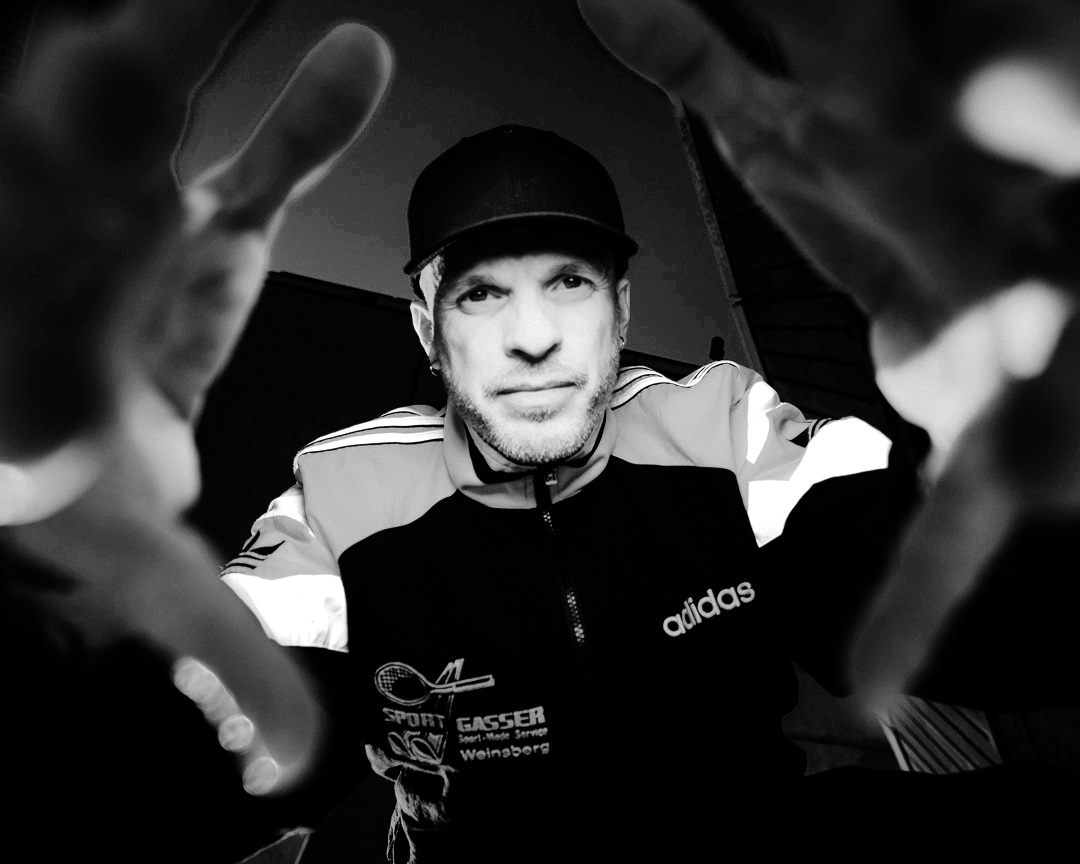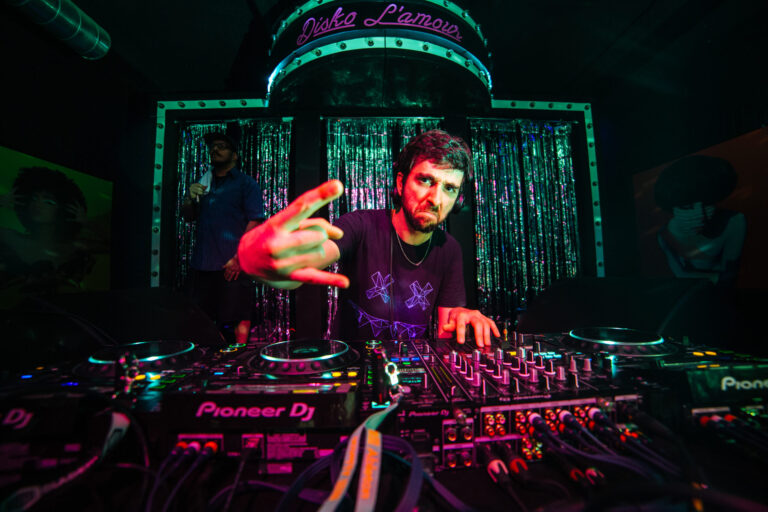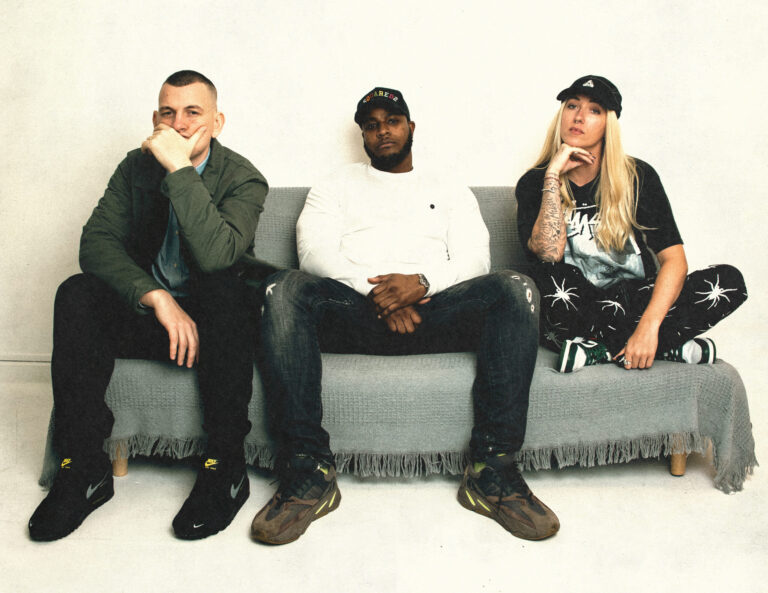Although a new name for drum and bass fans across the globe, Brighton-based Circadian is one of the men behind some of the biggest anthems that have blessed our genre across the past decade.
If we mention stadium-shattering tracks like ‘Electric’, and ‘Kill The Silence’, we’re sure you can connect the ‘Pale Blue Dots…’
Having launched his new alias in April this year, Chris Garvey, best known as one-half of the drum and bass duo The Prototypes, is now embarking on a fresh musical journey with his solo project. Whilst The Prototypes will always be a part of his musical identity and a proud achievement in life, Circadian represents a new chapter in his career, and a chance to express himself in different ways
Three releases into this new and exciting venture, Circadian is truly showcasing his sonic versatility and prowess, delving into previously unexplored territories whilst staying true to the sound and culture that has enamoured him for decades.
We caught up with Chris to talk about all things Circadian, as well as delve into his musical roots, his highlights during his time with The Prototypes, and why his new alias represents “The Ying Yang of Rave Culture”…
Hey Chris. You couldn’t have chosen a much nicer location for a chat! Have you always lived in and around Brighton?
Yeah man, I’ve lived here since I was five, but dotted around for a while when I was younger. I was born in London and then lived in Scotland for a bit. After that, I grew up on the outskirts of Brighton.
It’s really not a bad part of the world to grow up in! I’m really interested in knowing how Brighton has shaped your love for drum and bass, but music as a wider passion as well?
Dance music-wise, it totally, totally shaped my love for it. I think my earliest recollection of rave music was when my mate James brought back a mix CD called ‘The Drop’ that he got from a night at the Brighton Centre that he managed to get into when he was a bit younger than me. He looked a lot older and I just wasn’t quite there yet haha.
I feel your pain mate… that was me until about 21.
Me too. James put this mix CD on man, and I just remember that first tune. I still don’t even know what the first tune was, but it was just that classic drum bass sound. I had a PA system rigged up in my room because I was playing in a band and I was DJing by that point.
So was this CD your introduction to drum and bass?
It wasn’t my introduction to d&b, but that’s kind of when I found out what it was. Before that point, I was listening to bands like Nirvana and Guns N’ Roses.
It was still that sort of aggressive and rebellious strain of music then. Even though drum and bass is completely different, it’s the same ethos behind it.
My taste has always been aggressive. When I look back at what I used to listen to growing up, I think, yeah, I can see why I like drum and bass. Some of those tunes were basically just sped-up drum and bass. A lot of it was made at 190BPM, which explains why when I started to make drum and bass I was writing it at 190BPM.
No way! How long did it take you to slow it down a bit?!
Luckily not too long. In terms of dance music though, Brighton has probably been my home. I didn’t really travel to London and go and do big raves.
You can’t beat your local raves and the community that makes them.
Exactly that. The Lunacy night was a weekly at The Volks on the Brighton seafront. It was every Friday and eventually my mates and I would just be down there Friday and that was it.
It gets to the point where it’s not even a question of whether we’re going, it’s just what time are we going…
It was funny because the group that went just kind of grew and eventually I would have just bodies scattered all over my room from the night before. My mum would just be there in the morning making breakfast for everyone.
Big up Mrs. Circadian! Did your parents have much influence on you getting into music then?
It was huge. Both my mum and dad were classical musicians. They played in the London Symphony Orchestra and have always toured around with orchestras, which is why we moved around when I was younger. I would always be taken up to classical concerts and at that age, I used to find it quite boring actually. But I do feel incredibly lucky because I feel like music is just sort of in me as a result.
It must have been amazing to grow up with that level of musical talent and inspiration around you.
It was incredible. Both my brothers were musicians as well. My oldest brother’s a drummer, so there have always been drums about and being bashed. That’s actually where a lot of my influence for drum fills and all that kind of stuff has come from, just remembering hearing him do something sick on the drums.
I guess it becomes embedded in you as a result.
My brother is a guitarist and was also one of the first people that introduced me to music technology. He gave me a four-track tape recorder, which takes a cassette tape, takes the stereo channels on both sides and just uses them as 1, 2, 3, and 4. That’s how I was starting to make music at that point. And it wasn’t later until I moved schools that I met a teacher John Long, who took me under his wing and put me in front of the computer, he put me in front of the Reason One actually. He gave me a space to sit at it and be away from all the rubbish at schools and I was just allowed in there whenever I wanted.
That’s amazing. Were you just basically messing around with all sorts of sounds back then?
It was all sorts really. But as soon as I got into DAWs, I was into making drum and bass. I also made hip hop with a mate and I actually wrote an album called Brighton Based. There’s one song on the album called ‘Drug Affair’, which is based on our time set at a certain club in Brighton, about the night out, the feelings.
There’s something really beautiful about when you look back to that time that you got into underground music, discovering this world that you didn’t know existed.
Isn’t it? Your mind is all of a sudden blown, fully open again. I’ve had some proper moments where you lose your shit with a tune that just comes in out of nowhere and you’re like, wow, what is that.
Was there a moment for you then when that was happening early on in your music career when you were like, I need to be the one doing that to other people?
I’ve always wanted to do it. I’ve always loved DJing and I’ve always loved making tunes I just had this addiction to do it. I didn’t even know it was an addiction, but it’s what I’ve spent my whole life doing now.
When did it evolve from that early desire to the point that you and Nick started The Protoypes?
So I’d been making tunes for some time. I think one of the things that I was always really bad at was getting myself out there. I’ve always been more of a recluse than an extrovert. I just wanted to make music and I got to a point in my raving career where I knew I was never going to just make it as a DJ. But I did know that my tunes would get me there though. Anyway, Nick and I had met each other quite a few times because we used to run rival nights in Brighton on the same night.
No way. What club were you in and what club was he in?
He was in The Standard, which is shut now, and I was in The Volks. We were kind of bumping into each other around that time and some of my housemates knew him from running nights as well. From there, we started doing a weekly pirate radio show up in London and it was a lot of fun. Then it wasn’t until some years later when he was at university in London and I was a full-time Music Technology teacher that I just decided that this wasn’t what I wanted to do anymore. I knew what I wanted to do and it was to make music. So I gave in my resignation at the school and I found a two-day-a-week job teaching whilst making music during the rest of the week.
Were you and Nick still in contact quite a lot at this point?
Not for a while actually. But once all this happened, we were just talking more and then Nick and I kind of realised that we wanted the same thing, so we decided to write tunes together. We wrote a load of tunes quite quickly and then we started to wait outside clubs and give the tunes out. Eventually, Roni Size picked it all up and then Andy C started playing it too. There was a time outside Audio when we were waiting outside to give Andy a CD and he was like, “Oh, I know you guys, you’re The Prototypes. I’ve cut this dub of one of your tunes!” That was back in 2009/2010 and it was nuts at the time.
I love that story. So at what point did it go from giving out tunes outside clubs to becoming a bit more established and signing to Shogun in 2011?
Well, DJ SS first signed Breathless to Formation Records. Then Cascade/Need The Love came out on Infared Records in 2010. I feel like Cascade really put us on the map. Then we had a very early release on Viper Recordings as well with Darrison called Evolution. It was after that when we signed to Shogun.
Over a decade you became one of the biggest duos in drum and bass. What were some of the standouts and highlights from that time?
‘City of Gold’ was definitely a highlight. Just what that album did for us, it was crazy. And it’s weird when you’re younger and you’re just coming through because you don’t really realise what’s happening and you don’t really notice the signs of it all starting to happen. You just want carry on pushing and pushing and you’re so focused on the next step that you don’t take in what’s happening.
I guess you’re always thinking about the next big thing. It’s impossible to almost stop and take it in sometimes, isn’t it?
You only think about the next thing, the next tune to finish or the next set to prepare for. Supporting people like The Prodigy at Exit Festival was really epic. That was like 35,000 people there.
Wow…
The Let It Rolls were amazing too. I remember when we turned up for the first time, Netsky was playing on the Main Stage there to at least 3000 people. At that moment, I decided that we had to play on that stage. It took us years to work towards that Main Stage at Let It Roll, but once we did, I think we did it four or five years in a row after that.
The Prototypes were obviously big in the UK scene, but you guys are massive in Eastern Europe as well right?
Yeah, man. I’ve always had a bit of a self-confidence issue. I remember being reassured and told that we were the most requested artist in the drum and bass scene out there. Everyone was just asking for The Prototypes.
That brings us nicely to talking about what you’re doing now then with the Circadian project. So before we go into anything that’s happened so far, talk to me about the alias and the reason behind the name.
So over lockdown, even pre-lockdown, I’d been in a bit of a weird place for a while. Anyway, over lockdown it just kind of heightened everything that was happening to me, especially without shows and all that kind of stuff. I was battling really bad anxiety problems. I ended up in the hospital because I thought I was having a heart attack, things like that.
That was actually after I came back from the Pendulum tour in New Zealand, which was during the UK’s lockdown. That was when I really started to realise how bad my anxiety was because I kept thinking I was going to die. I did feel so incredibly lucky to go over there and do that because it was the best tour I’ve ever been on. Since then, it’s been something that I’ve been working on basically and continuing to work on and learning how to live with it. I don’t think it really goes away as such.
I’m sorry to hear that man and I have full respect for you talking so openly. It’s amazing to see what you’ve done with this project in a matter of months coming off the back of that battle. At what point then was it in lockdown that you decided that you wanted to start Circadian?
It was through that journey that I basically started to understand what circadian rhythms are and all that kind of stuff. Put two and two together, with the yin yang of throwing yourself across the world into different time zones, as well the yin yang party element of my life over the tour, and for me, that’s what Circadian is all about.
I feel like it’s everything that I’ve learned on my journey so far about my life. The good, the bad, the highs, the lows, you know what I mean? It’s all gravelled within it for me. There are lots of things I wanted to do for a long time and this project will allow me to do that.
I love that. And in terms of the music, you can hear that it’s got that dance floor sort of orientation that The Prototype’s had, but it’s a much more modern sound. So is that something that you’ve done to tie yourself in with the times or is that something that you’ve always wanted to have as your output?
One thing I’ve noticed throughout my career is that I get these peaks and troughs where you really drum and bass and then you’re not quite feeling it as much again. But at some point, I just started hearing this sound that I just really loved again and it really just made me really excited to make drum and bass again.
Have you got any examples of what sort of songs or the producers of that song that you’re talking about?
It’s just the vibe of a song that I’m drawn to, I’ve always been shit with track names. When I was looking at vinyl, I always used to go through just the white labels and I wouldn’t even look at who the artist was because I didn’t want it to influence me buying it. But yeah, I like big bashy drum and bass. I like music with a lot of energy.
The music you’ve released this year perfectly encapsulates what you’re saying. ‘Mesmer’ is absolutely mental, ‘Body Work’ is really high-energy and aggressive, and then I’d say the Koven collab ‘Outlines’ is all about feel-good d&Bb energy. How do you feel about the first few months of Circadian?
It was really scary to start. With ‘Body Work’, I wanted to release a tune that people would play in their sets and thankfully it had really good DJ support. I was really, really, really pleased to see how it’s been received. And just generally as an act, I think really pleased with how it’s been received. I think people know I’m doing it for the right reasons.
One more question from me. Is there an end goal for this or do you just want to see what happens with this project?
Goals? I think it’s pretty weird how goals have changed for me. I was only talking about that very recently. When I was a kid, you’d reach one goal and then you’d just be thinking about the next. I think I’ve reached some of my first goals because I’ve had my first solo release, I’ve been supported by my peers, and I’ve had an upload on the UKF D&B Channel. I like realistic goals that I can achieve in a short amount of time now. And if I had one big goal, it’s just to be a successful drum and bass act.


